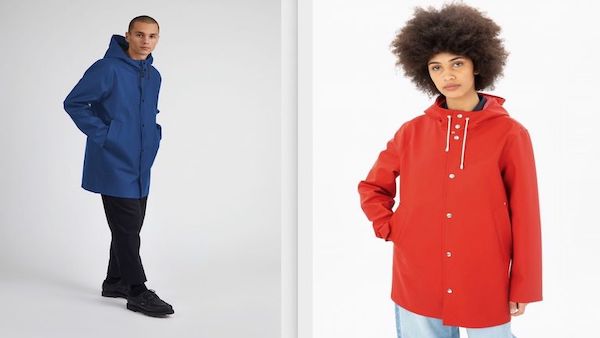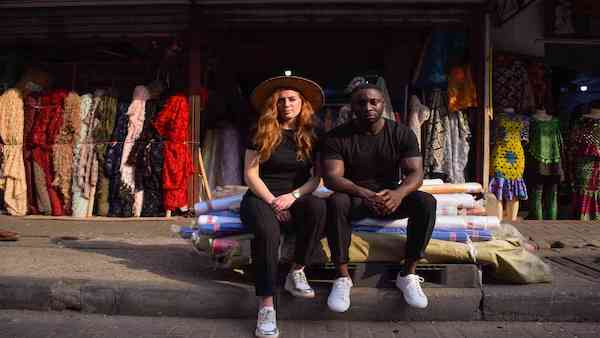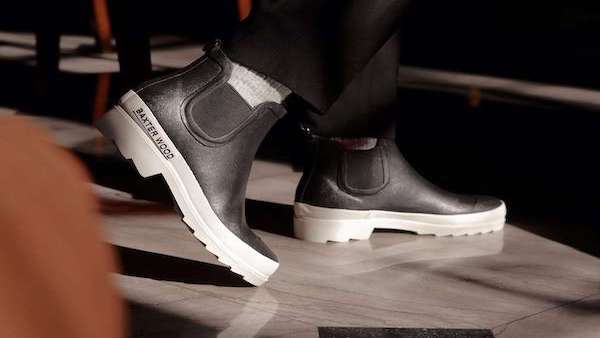
This Company Makes Rain Gear From Recycled & Natural Materials
KATHERINE MARTINKO
Baxter Wood brings innovation to a market that's been stagnant for too long.
Baxter Wood is a rain gear company with a noble mission – to stem the tide of plastic waste in low-income countries. It does this in a number of ways. First, its waterproof products use no virgin synthetic materials. Their gender-inclusive coats are made from 100% recycled PET, which comes from plastic bottles. Each jacket contains 22 bottles' worth of material.The rain boots are made with all-natural rubber, collected from trees in Sri Lanka that are certified by the Forest Stewardship Council. This makes them vegan and biodegradable, and wholly different from the 99% of rain boots on the market, which are made from plastic, according to the company. As stated on the website, "If more companies used natural rubber, we could all reduce our need for petroleum as a raw material source."
Baxter Wood was founded by Ghanaian-born designer Kweku Larbi and his fiancé Sarah Smith. Larbi told Treehugger that he opted to work with rain gear because it's a market that hasn't seen much innovation.
"Most raincoats are made from PVC or simply put polymers from petroleum... Most people might know Rothys for tackling sustainability with slip-ons, and Allbirds for bringing to life the sustainable sneaker. We believe what was left to be improved are rain boots, so we went ahead and made rain boots out of 100% renewable materials, with our rubber coming from hevea rubber trees (and not petroleum-based)."

Company founders Sarah Smith and Kweku Larbi - Baxter Wood
Larbi shares the view I've expressed before on Treehugger, that upcycling plastic only makes sense when it's contained in an item that does not have to be laundered frequently, causing it to shed plastic microfibers into the wash water. I liked his use of the word "hideout," as if the jacket is a secure location for old plastic:
"Did you know every piece of plastic ever made still exists? We had to put post-consumer plastics to use, and our raincoats are the perfect hideout, building them into a coat that will depend on the natural waterproof, and durability characteristics of plastic, but also maximizing the quantities of plastic bottles used per coat as our silhouette styling permits. It’s a win-win for us and the planet."

Baxter Wood
The company's environmental focus doesn't stop with its own goods. It also accepts all old rubber boots for recycling, giving customers a pre-paid shipping label and a $30 credit. These boots go to Michigan, where they're shredded and turned into a range of items from playground surfaces to roads to kickboxing bag fillers. "By using one tonne of rubber from recycled rubber rain boots to surface an arena, we’ll save three tonnes of C02 from being emitted into the atmosphere."
Larbi said that, although the company is a year old now, the recycling program only started in December 2020; however, a preliminary trial with 50 subscribers earlier in the year brought in plenty of old boots. He shared an anecdote:
"One was a relic of a Hunter boot from the 1990s, with the printed logo on the shin. We decided to keep that as a memory of how long rubber boots stick around when they are not recycled... That boot was enough of a signal to us, informing us why we needed to recycle what we and others produce. It’s great to create, but equally important to uncreate."
Furthermore, the company donates a portion of proceeds to the charity 1% For Education , which provides education for children in developing countries.
The items are made in Asia, but as explained on the website, its production facilities are picked strategically based on their proximity to natural rubber farms and the factories producing rPET (recycled plastic to polyester).
It's still early days for the company, but it appears to be on a noble and intelligent mission with its eco-friendly designs and helpful recycling program. Check it out if you're in the market for new rain gear.

